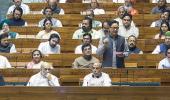'When the Bill was passed all have been exposed. There is no difference between communal and secular.'

Contrary to Bihar Chief Minister Nitish Kumar's Janata Dal-United's official line that the Waqf Bill is not anti-Muslim and will benefit Pasmanda Muslims (backward Muslims), JD-U Muslim leaders assert that the Waqf (Amendment) Bill 2024, that was passed by Parliament, is anti-Muslim and Pasmanda Muslims will not benefit from the legislation.
While supporting the Bill in the Lok Sabha, senior JD-U leader and Union Minister Lalan Singh on April 2 said the Waqf Bill is not anti Muslim.
But Muslim leaders in the JD-U are unhappy and angry over their party's stand.
Senior JD-U leader Mohammad Qasim Ansari said Nitish Kumar has disappointed thousands of Muslims by supporting the Waqf Bill.
"We were shocked by the JD-U's stand on the Waqf Bill. The fact is that the Waqf Bill is against Muslims and is anti Muslim. We will not accept the Bill because it violates the basic rights given by the Constitution. The Waqf Bill is anti Pasmanda Muslim as well. Neither Nitishji nor the party felt it," says Ansari, who is himself a Pasmanda Muslim.
On Thursday, Ansari resigned from the JD-U in protest against the party's support for the Waqf Bill.
Another JD-U leader Shajnawaz Malik resigned the party for its support to the Waqf Bill. Malik was the JD-U's Jamui district president.
"I was against the Waqf Bill before it was passed and I am still against it. There is no question of a change in my stand," says Janata Dal-United MLC Gulam Gaus.
Gaus had told this correspondent earlier this week that the JD-U was against the Waqf Bill and had sounded hopeful that Nitish Kumar, the JD-U president, would oppose the proposed legislation.
Gulam Gaus, who is also a Pasmanda Muslim, stayed silent when this correspondent asked him on Thursday if he will now protest against the JD-U stand.
Another JD-U leader Ahmad Ashfaque Karim, who spoke out against the Waqf Bill, refused to comment after Parliament passed the Bill with his party's support.
Senior JD-U leader Ghulam Rasul Balyavi says he will challenge the Waqf Bill in the Supreme Court.
"When the Bill was passed all have been exposed," Balyavi said. "Now there is no difference between communal and secular."
"I appealed to Nitish Kumar," Balyavi added, "but nothing happened."

The Bihar government sounded a high alert in the state on Thursday following Parliament's approval of the Waqf Bill.
The Bihar police headquarters has directed superintendents of police of all districts to be on alert and monitor the situation closely. The alert is related to intelligence reports that some protest may take place against the Bill.
Last month on a call issued by the Patna-based Imarat-e-Shariah, an influential Muslim body working for the rights and empowerment of the Muslim community in Bihar, Jharkhand and Odisha, Muslims collectively boycotted the Iftar party hosted by Chief Minister Nitish Kumar at his residence.
Thereafter, the Imarat-e-Shariah organised a protest in Patna along with the All India Muslim Personal Law Board on March 26 to oppose the Waqf Bill, particularly Nitish Kumar and the JD-U's support for it.
This was the first major expression of Muslim unhappiness against Nitish Kumar in recent years.
Muslims constitute about 17.7 percent of Bihar's population and are considered traditional supporters of the Rashtriya Janata Dal, the party founded by Lalu Prasad, but roughly 25 to 30 percent of Muslims reportedly supported the JD-U in consecutive elections because of Nitish Kumar's presence at its helm.
In Bihar's caste-dominant politics, Muslim support can make or mar the final electoral outcome.
Feature Presentation: Aslam Hunani/Rediff.com











 © 2025
© 2025